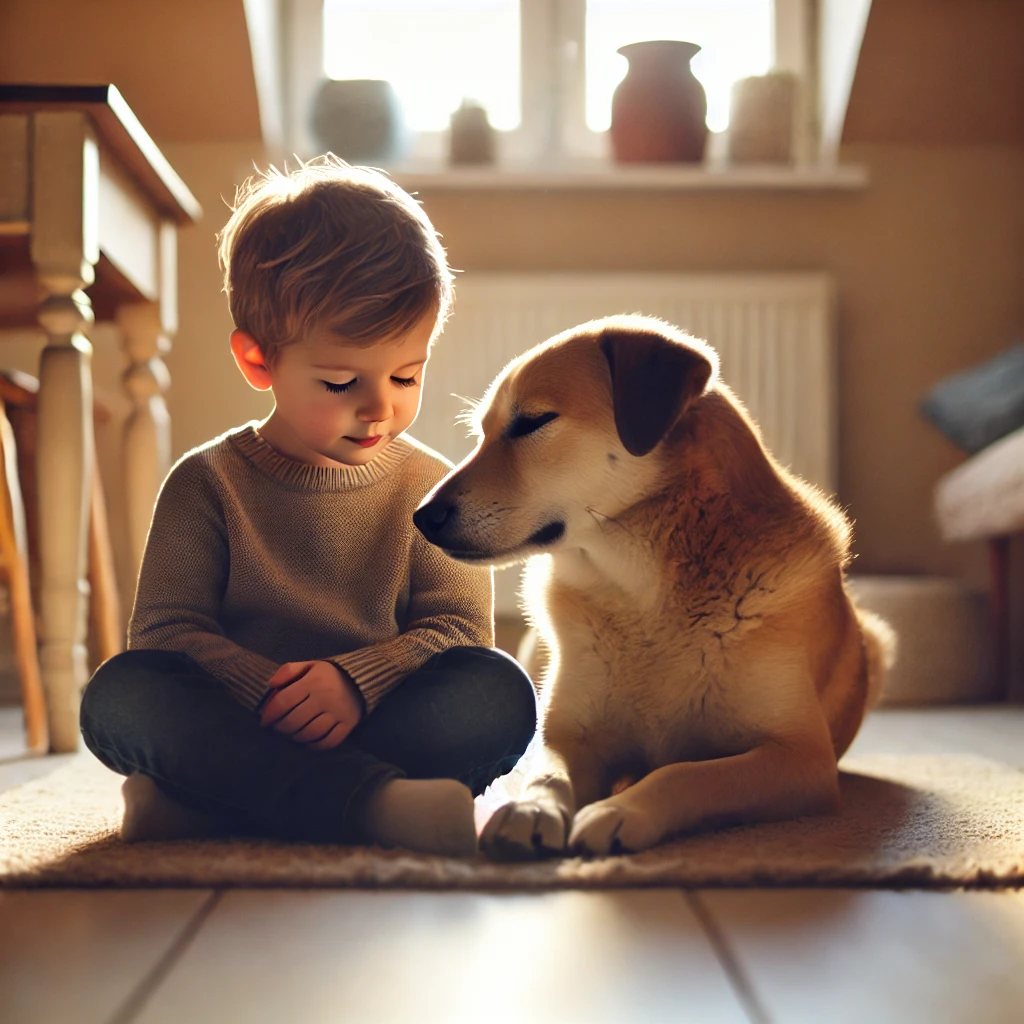For children with autism, companionship plays a vital role in their emotional and social development.
Pets offer a unique, supportive form of companionship that helps children feel understood and comforted. From offering loyalty and love to helping with routines and social skills, pets as companions for kids with autism offer countless benefits, supporting them in ways that friends or family sometimes cannot.
The unconditional bond between a child and their pet can make a significant difference in helping children feel more connected, confident, and calm.
Here are eight benefits of pets for children with autism.
1. Unconditional Love and Acceptance
One of the most valuable things pets offer children with autism is unconditional love and acceptance. Pets, especially dogs, do not judge or hold expectations, making them a comforting presence for children who may struggle to feel understood by their peers.
The warmth of a pet’s constant affection creates a safe, accepting environment where a child feels loved for exactly who they are. This can be especially important for children who may face challenges in forming friendships.
For example, a child with autism who struggles with social connections may feel an incredible sense of comfort and joy knowing that their pet is always there, eager to greet them with love and without judgment.
2. Non-Judgmental Companions
When it comes to autism and pet companionship, pets are always non-judgmental, which is invaluable for children with autism who often feel anxious or misunderstood.
Unlike people, therapy pets for autism do not have preconceived expectations or judgments, creating a safe space where children can be themselves without the fear of rejection. This sense of acceptance helps children feel more confident and relaxed, making it easier for them to express themselves.
For instance, a child with autism may feel comfortable talking to their pet or expressing emotions around them in ways that feel less natural around people. This unique relationship lets children experience acceptance in a form that’s comfortable and soothing, building a foundation of self-assurance that can extend into their relationships with others.
3. Helping with Emotional Regulation
Companion animals for autism can be instrumental in helping children manage their emotions. The calming presence of a pet—whether through soft touch, a purring sound, or simply their company—can help soothe children during stressful or overwhelming situations.
Studies show that petting animals can reduce cortisol levels and increase serotonin, which helps children feel more grounded and balanced.
For example, when a child is feeling anxious or overstimulated, petting a cat or cuddling with a dog can create a calming effect, helping them regain emotional control.
Pets provide a reliable emotional anchor, supporting children in self-regulation and making it easier for them to manage daily stressors.
4. Encouraging Responsibility and Routine
The responsibility of caring for a pet brings a rewarding sense of accomplishment and routine, which is beneficial for children with autism who often thrive on structure.
Feeding, grooming, or walking a pet provides consistent tasks that give a child a sense of control and predictability. Having these regular responsibilities helps create a rhythm to the day, which can make transitions easier and minimize anxiety.
For example, a child who knows they need to feed their pet at a specific time each day gains a sense of structure, which can carry over into other areas of their life. This responsibility boosts their self-esteem and helps them feel competent and valued.
5. Enhancing Social Interaction
Pets can be natural facilitators of social interaction, providing children with autism a comfortable way to engage with others.
Whether it’s meeting other pet owners at the park or showing off their pet to friends, pets create a reason for children to interact in social settings. This can be especially helpful for children who feel shy or struggle with social cues.
For instance, a child may feel more comfortable talking to other kids when discussing their pet or introducing their pet to new people.
Pets offer an approachable common ground that helps children build social confidence, making it easier for them to form connections with others in a more relaxed environment.
6. Providing Comfort in Difficult Situations
During times of stress or difficulty, pets offer comfort and support that help children with autism feel less overwhelmed. Their presence can be incredibly reassuring, especially during meltdowns or challenging moments.
A pet’s calming influence and gentle companionship provide a source of solace that children can rely on during tough times.
For example, a child experiencing sensory overload after a busy day at school may find comfort in sitting quietly with their pet, feeling the soothing effects of their companionship.
This emotional support not only provides immediate comfort but also strengthens the child’s resilience, helping them feel more equipped to manage future challenges.
7. Promoting Physical Activity
Pets, especially dogs, encourage physical activity, which benefits both the mental and physical health of children with autism. Regular exercise can help provide children with a positive outlet for their energy by:
- Reducing stress
- Improving mood
- Increasing focus
Activities like walking, playing fetch, or even gently brushing a pet can help children stay active and engaged.
For instance, a child who enjoys playing outside with their dog may find that this physical play becomes a cherished part of their daily routine. Pets motivate children to move, supporting their physical health and overall well-being in ways that go beyond typical play activities.
8. Boosting Confidence and Self-Esteem
Caring for a pet can significantly boost a child’s confidence and self-esteem, as they experience a sense of accomplishment in meeting their pet’s needs.
Successfully feeding, training, or grooming a pet provides children with a sense of mastery and pride, reinforcing their belief in their abilities. This boost in confidence can extend beyond pet care, positively influencing how they approach other tasks and challenges.
For instance, a child who teaches their dog a new trick may feel proud of their achievement, gaining a valuable sense of competence and self-worth. Pets provide an opportunity for children to feel capable, appreciated, and confident in their skills.
Conclusion
The companionship that pets provide can be transformative for children with autism, supporting their emotional, social, and physical development in countless ways.
From offering love and comfort to encouraging social interaction and responsibility, pets bring unique benefits that enrich the lives of children with autism.
If you’re considering a pet to support your child, consult with experts at Pettable (the best ESA letter service on the market) to explore options like emotional support animals for autism and service animals for autism. Or, if you already have a support pet, consider an ESA letter service to maximize your benefits.
A pet could be the perfect companion to help your child thrive and feel truly understood.










